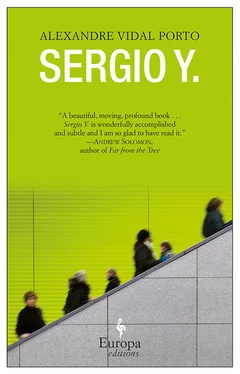There, away from her family, surrounded by a language she barely understood, her life still seemed like one of exile. At that moment, happiness for her was nothing superlative. It was something as simple as the absence of pain.
Sometimes, she would try on the clothes she had sewn, to experience how they fit over her own body. She would look at herself in the mirror and would feel proud of the perfect finish she had achieved.
However, the day she put on Mr. Hafner’s black velvet jacket in order to check the shoulder stitching, she became aware of something much more important than the fit.
On the shop wall Adriana saw her reflection, her hair pulled back, wearing a man’s black jacket. And for the first time in her life, the pain that had been with her from birth suddenly stopped.
So by chance, like Isaac Newton and the apple, Adriana discovered that dressing like a man made her happy. She was only nineteen and had her whole life ahead of her. For the first time in her life, the awareness that she was still young cheered her.
Father Siaudizionis had been right after all. In America, she had found happiness. Her discovery, however, was personal and private. She could not share it. She would dress as a man when her husband was not home. For that first year in America, this was reward enough.
Adriana became a happy person. In the mornings, after her husband had gone out to deliver the orders, she would wash the dirty dishes from breakfast and sit at the sewing machine for another day’s work. She would look in the mirror and decide, then and there, which clothes would kill her pain that day. Sometimes, she would wear Frank’s shoes and spend the rest of the day looking at her feet in the mirror. At other times, she would wear a shirt and tie. In winter, she would wear a hat.
The news was delivered by two policemen who arrived at the shop at 4 P.M. on a Wednesday. At age 20, Adriana Zebrowskas had become a widow. Frank was dead, run over by a streetcar near Lake Michigan. His body had been mutilated and was hastily buried on Thursday.
Few people attended: two clients, two suppliers, the bookkeeper, Mr. Zydrunas, and three Lithuanians who greeted her but whom she could not identify. After the funeral, Mr. Zydrunas walked her to the trolley stop. On the way, he asked if she intended to sell the tailor shop. Adriana did not know how to answer. She thought she would have to do something with her life. Maybe she would return to Gekodiche. She did not have much of a choice.
Back at the apartment, Adriana lay down on her bed and slept until the next morning. She opened her eyes and saw a beam of light coming in through the window and hitting the wall.
In the morning silence, the light did not help illuminate her anxiety. Adriana still felt pain. She remained in bed until 9:30 A.M., crying, as she had in Gekodiche before falling asleep. She thought about her parents. She thought about going back to Lithuania. She still knew almost no one in Chicago. She had not yet managed to establish roots. Many other thoughts occurred to her; however, she was forced to get out of bed and resume her routines. She had orders to fill.
In a state of extreme pain, she worked in Frank’s clothes: shoes, hat, jacket and tie. She sewed without thinking. She delivered the clothes herself. The Russian grocer and the German butcher who called her “lady” knew she was now a widow. The clients knew too, and they received their orders with faces filled with pity and did not even bother checking whether the pieces required adjustments or not.
She had already written three letters to Helena Viriaudis — the last one announcing Frank’s death — with no response. However, just over a week after her husband’s death, on a Friday, she found an envelope in the mailbox. The letter was from New York, but it was not in Helena’s handwriting. Instead the name of Helena’s uncle, Adam Viriaudis, appeared with the return address. He wrote the following words:
Dear Mrs. Zebrowskas,
I have received your letters addressed to my niece Helena Viriaudis. I wish she were the one writing to you, but the Almighty has willed that our beloved Helena should leave us prematurely, a victim of typhus. To her dying days, my niece had only words of admiration for you and the quality of your work as a seamstress. I take this sad opportunity to add that good workers (seamstresses and tailors) whom you might recommend are always welcome in my shops. With the aid of Providence, my business has done well, and I always have room for people with talent and a willingness to work hard.
Sincerely,
Adam Viriaudis
The weekend following that muggy Friday afternoon was transformative. The news of Helena’s death unleashed in Adriana an emotional turmoil that Frank’s death alone had not been able to arouse. She had now lost her husband and her only friend. The two affectionate ties she had managed to establish in this new country had vanished, just like that. She was feeling more emotions than she was able to discern or process. Feeling so alone in a foreign country made her fatally vulnerable. She had to do something.
The following Saturday, in the morning, she gathered her strength, and she went to the bookkeeper’s office to discuss how much she could obtain for the tailor shop. She signed all of the documents he put before her and received an advance of $300 for the inventory and the machines.
She did not want to take the trolley home, and so she returned on foot. She looked at the passersby and wondered what ailments afflicted those men and women. What passions, what fears moved them through the streets of that strange country? For the love of whom did those people work?
She arrived at the shop weighed down by these questions. She ran up the stairs, as if she needed to use the bathroom. She opened the door and entered the apartment and cried. She cried for hours. She could not stop crying. She went to sleep crying. She woke up crying.
She tried to solve the problem with the only panacea she knew. She spent all day and all night in Frank’s pajamas. Sunday night, though, was particularly difficult. As if trying to heal herself with a massive dose of painkillers, Adriana dressed as a man from head to toe. She even put on Frank’s underwear. Nothing helped.
Frantic, standing in front of the mirror where she had seen happiness, she cut her hair with tailors’ shears. Concentrating intensely, she passed coal over her thick eyebrows and parted her hair to the side with the help of Frank’s hair grease, which was still on the bathroom shelf.
Adriana Zebrowskas observed the final days of her mourning dressed as a man. That was how she went out onto the streets. With male clothes, walking in the end-of-summer wind, a cold gust hitting her face. She thought of walking all the way to Lake Michigan, but instead wandered aimlessly all night, and when neighborhood prostitutes approached her, taking her for a man, offering their services, Adriana liked it. Strangely, she felt happy again.
That night, Adriana had been transformed. And now she needed a new life for this other person who had just been revealed to her, who had existed all along inside, protesting throughout her entire life, preventing her from being happy.
The sleepy clerk who stood before Adriana Zebrowskas at the County Clerk’s Office was accustomed to interacting with people of all different types. It was not unusual for newcomers seeking new documents to come wearing clothes typical of their countries of origin.
New arrivals kept coming to Chicago. In addition to the Lithuanians, there were the Italians, Jews, Greeks, Germans, Chinese, southern blacks — all types. That tall, thin man, with coal under his nails, had lost his documents. He was just one more immigrant who could not speak English. He needed a copy of his birth certificate. His name was Angelus Zebrowskas, male, born in Gekodiche, Lithuania, on March 19, 1897. That was all Adriana had to do: fill out a form and take a picture with the photographer on the corner.
Читать дальше












